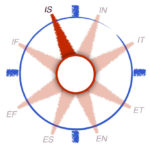We could say that introverted sensation transmits an image which does not so much reproduce the object as spread over it the patina of age-old subjective experience and the shimmer of events still unborn. – C.G. Jung (CW 6, par 649)
With this article, and the one to follow next month, we examine the type that has been more difficult to grasp than any of the other types.
Normal Introverted Sensation (IS)
 As an orientation to conscious experience, introverted sensation bridges the “great divide” between the outer and inner objects: the world at large and the collective unconscious. The bridge originates in the world, where the sensation attitude is oriented to sensuous perception. All of the sights, sounds, tastes, and textures discerned in the world are of potential interest. Like extraverted sensation, introverted sensation has the initial capacity to perceive the world accurately and in detail.
As an orientation to conscious experience, introverted sensation bridges the “great divide” between the outer and inner objects: the world at large and the collective unconscious. The bridge originates in the world, where the sensation attitude is oriented to sensuous perception. All of the sights, sounds, tastes, and textures discerned in the world are of potential interest. Like extraverted sensation, introverted sensation has the initial capacity to perceive the world accurately and in detail.
Yet that accurate, detailed perception is radically transformed as the mighty breeze of the introverted attitude draws those accurate perceptions inward, across the bridge, to the preternatural archetypal world within. The bridge is much like the closet door imagined by C. S. Lewis in The Chronicles of Narnia. On one side of the closet door, everything is normally perceived and subject to the known laws of nature. But through that door, on the other side in Narnia, the rules of the world no longer apply.
So it is for introverted sensation. The perceptions of the world pass over a figurative bridge and emerge in the inner life, where the normal experiences of time, cause and effect no longer apply. In this inner world, perceptions take on an uncanny character, for they are imbued with a “patina of age-old subjective experience and the shimmer of events still unborn.”
Introverted Sensation in the Shadow
When we talk about a type “in the shadow” we are speaking of the type in the “inferior,” less developed position–unconscious, primitive, or archaic.
In the shadow, introverted sensation is less accessible and its transcendent perceptions are less noticed. A person may be less sensitive to the deeply evocative beauty of a sunset; less moved by the flowing melodies in a magnificent concert; less enchanted by a stroll through a rich, dark forest; less attuned to the majestic context for “ordinary” day-to-day events.
